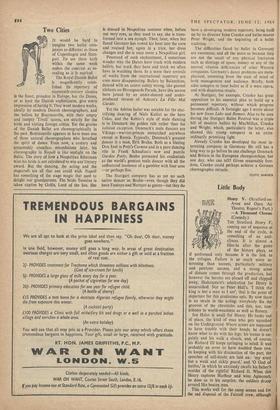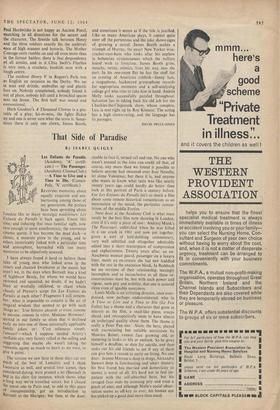Little Body
Henry V. (Stratford-on- Avon and Open Air Theatre, Regent's Park.) ry —A Thousand Clowns. (Comedy.) THE Stratford Henry V, coming out of sequence at the end of the cycle, is something of an anti- climax. It is almost a filler-in after the gusto of the history plays, as if performed only because it is the link to the trilogies. Failure is so much more in- teresting than success, particularly military and patriotic success, and a strong sense of distaste comes through the production, but however the heroics are planed off and chipped away, Shakespeare's admiration for Henry is untarnished. Not so Peter Hall's. 'I think the king is but a man as I am'; that is the point of departure for this pianissimo epic. By now there is no strain in the acting; everybody fits the grooves of the chronicles and this, too, con- tributes to world-weariness as well as fluency.
Ian Holm is small for Henry. He looks out of place, the kind of man who gets squashed on the Underground. Where actors are supposed to have trouble with their hands, he doesn't know what to do with his legs; his stance is un- gainly and his walk a slouch, and, of course, his Richard III keeps springing to mind. It was probably an error to have doubled these two. In keeping with his diminution of the part, the speeches of self-doubt are laid on : 'my army but a weak and sickly guard,' and '0 God of battles,' in which he anxiously recalls his father's murder of the rightful Richard II. When this Henry captures Harfleur and wins Agincourt, he does so to his surprise; the soldiers droop around like beaten men.
This works well for the camp scenes and for the sad disposal of the Falstaff crew, although
Paul Hardwicke is not happy as Ancient Pistol, snatching in all directions for the accent and the character. The fireside talk between Henry and the three soldiers exactly fits the ambival- ence of high manner and hysteria. The Mother Courage carts rumble on and off even more than in the former battles; there is that despondency of all armies, and in it Clive Swift's Fluellen is very sure, a crochety, bookish man with a tough centre.
The outdoor Henry V in Regent's Park was as English an occasion as the Derby. We sat in mist and drizzle, umbrellas up and plastic hats on. Nobody complained, nobody found it out of place, nobody left until a bronchial spasm sent me home. The first half was sound and conventional.
Herb Gardner's A Thousand Clowns is a pin- table of a play; hit-or-miss, the lights flicker up and one is never sure what the score is. Some- times there is only one clown, James Booth,
and sometimes it seems as if the title is justified. Like so many American plays, it cannot quite steer off the portentous and the joke shows signs of growing a moral. James Booth makes a triumph of Murray, the smart New Yorker wise- cracker-cum-bum who looks after his nephew in bohemian circumstances which the welfare board wish to foreclose. James Booth grins, mouths, twists, mimics, lives his way into the• part. In his one-room flat he has the stuff for an evening of American rubbish—funny hats, a megaphone, hackneyed gramophone records for appropriate moments and 'a self-analysing college girl who tries to take him in hand. Andre Melly looks successfully puzzled throughout. Salvation lies in taking back his old job for the Chuckles-the-Chipmunk show, whose compere, Leo, is sent right up by Roy Kinnear. The acting has a high clown-rating, and the language has its passages.
DAVID PRYCE-JONES



































 Previous page
Previous page